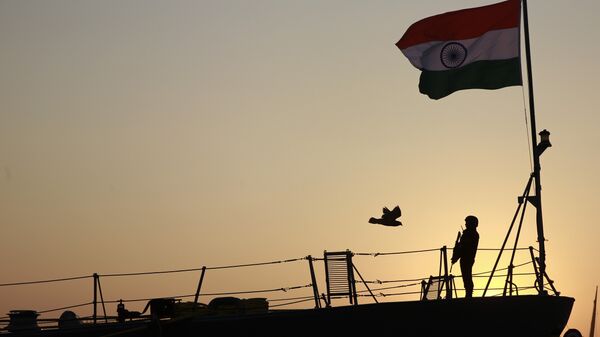Speaking at the 2019 Eastern Economic Forum in Russia's Vladivostok on Thursday, Indian Prime Minister Narendra Modi said that New Delhi would not take any military measures to ensure the security of its ships in the Strait of Hormuz.
He added, though, that India had made certain security arrangements for its oil tankers passing through the strategic waterway.
"Recently, the problems that exist in this region have made us think that we should not suffer from the side-effects of the situation that we are currently observing. So that our safety is not jeopardised, while tankers and vessels are not damaged. We have taken measures to ensure security of our tankers, we have taken security measures to ensure their safety, but we will not take any additional measures, this is not our way to pursue a military path, and no one in the world is discussing our measures in any negative way", he pointed out.
Russian President Vladimir Putin, in the meantime, noted that while Moscow was interested in the de-escalation of tensions in the strait, "technically" it saw "no problem" in protecting its vessels through military means.
"Taking into account the development of our armed forces and the Navy, we do not have any problems with that. The most important issue here is the effectiveness of these actions in the settlement of tensions and strengthening the security in the region and the Strait of Hormuz in particular", Putin said.
The comments by the two heads of state come against the backdrop of accusations by the United States and its regional allies that Iran had orchestrated a round of attacks on oil tankers in the Persian Gulf — an allegation that Tehran has strongly denied, urging Washington to stop the "blame game", "warmongering", and "false flag operations".
The first purported attack took place in May when four vessels — two Saudi, one Norwegian, and one Emirati — were "sabotaged" near the UAE port of Fujairah. A similar episode happened the following month in the Gulf of Oman, near the Strait of Hormuz, where two oil tankers — Japanese and Norwegian — were allegedly targeted.
Tensions were further exacerbated in July when the IRGC detained a British-flagged tanker, Stena Impero, in the Strait of Hormuz, accusing it of violating maritime rules and performing dangerous manoeuvres.
The detention came a few weeks after Gibraltar's authorities, assisted by UK Royal Marines, seized an Iranian supertanker over a professed crude oil delivery to Syria in violation of EU sanctions on the government of President Bashar al-Assad — a claim Iran has denied. Tehran has, however, pointed out that its decision to detain the UK vessel was not made in retaliation for the earlier incident.
As tensions were running high, Washington moved to invite a number of countries to join a coalition to police the Persian Gulf against an alleged Iranian threat. While some nations, including Germany and France, remain reluctant to sign up for a maritime mission out of concern they might be dragged into another war in the Middle East, the UK and Australia, among others, have agreed to pitch in.




